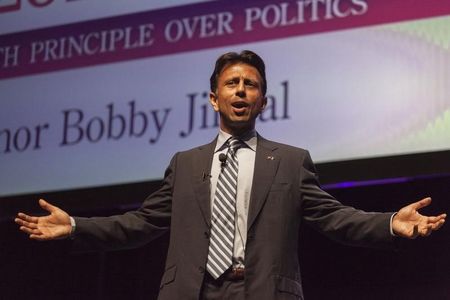By Gabriel Debenedetti and Valerie Volcovici
WASHINGTON (Reuters) - Louisiana Governor Bobby Jindal, a Republican considering a 2016 U.S. presidential run, accused the Obama administration on Tuesday of being "science deniers" when it comes to energy, a critique often aimed at his own party.
Jindal, whose state is a major energy producer, unveiled a plan intended to boost U.S. energy production and ease regulations. He said his plan would spur job creation and bolster the U.S. role in global energy.
At a breakfast sponsored by the Christian Science Monitor, Jindal told reporters he considered the Obama administration "science deniers when it comes to harnessing America's energy resources and potential." He said the administration has delayed approving the expansion of the Keystone XL pipeline despite a favorable environmental assessment from the State Department.
Jindal released a six-point energy platform that mirrors the positions taken by other likely Republican presidential contenders. He said that to leverage the energy renaissance fueled by booming shale oil and gas production, the United States needs to change Obama administration policies that he said make domestic energy expensive.
"It seems like the only types of energy sources (the administration wants) to fund are the ones that are expensive and won't succeed," he said.
His proposals include opening up energy production on federal land, eliminating proposed EPA restrictions on carbon emissions and other pollutants and approving the long-delayed Keystone XL pipeline.
But on the issue of climate change, he departed from some other potential Republican front-runners in the 2016 race.
Jindal acknowledged that human beings contribute to climate change and said the United States should work with other countries to address it.
Jindal told reporters: "I hope it's not controversial - I'm sure human activity is having an impact on the climate." He said scientists, not politicians, must determine the extent of this impact.
In May, Florida Senator Marco Rubio, another likely White House hopeful, grabbed headlines by saying: "I do not believe that human activity is causing these dramatic changes in our climate the way scientists are portraying it."
Rubio later said he denied that legislation could stop the climate from shifting.
In February, Senator Ted Cruz of Texas, a Tea Party favorite, said he believed current data does not prove that climate change is happening at all.
Jindal, 43, has been a frequent visitor to early presidential nominating states such as New Hampshire, and has worked to brand himself as an idea generator.
If Jindal decides to run, he would likely be part of a crowded field. Early polls suggest Jindal trails higher-profile Republicans such as Rubio and Cruz.

"There's no reason to be coy. I've said I am thinking about running for president in 2016," Jindal said, brushing aside early polling and saying he would not make a final decision before November.
(Reporting by Gabriel Debenedetti; Editing by David Gregorio, Caren Bohan and Ken Wills)
